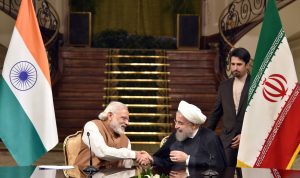Iran has reacted strongly to a story in a leading Indian newspaper about a January attack outside the Israeli embassy in New Delhi. On March 8, the Hindustan Times, quoting anonymous officials in the Indian security establishment, claimed that the Indian government believes the January 29 attack outside the Israeli embassy in New Delhi was carried out by the Islamic Revolutionary Guard Corps (IRGC).
“While Indian agencies have taken the attack very seriously, New Delhi is affronted that the Capital [sic] is being used by a friendly country to wage a proxy battle and the Modi government will take up the issue with Iran once the local supporters of the Iranian regime are taken into custody,” it stated.
Reacting to this story, though without pointing at it as such, the Iranian Embassy in New Delhi issued a press statement yesterday, in which it proffered a five-point repudiation of an “unfair onslaught and unsubstantiated defamatory accusations against Iran,” the gist of which being that Iran had nothing to gain from the January 29 attack given the damage it could do to India-Iran bilateral ties. The statement also described Iran and its people as “flag bearers of peace and security in the world,” and “on the forefront of fighting against terrorism, warmongering, and violence globally […]”
The March 8 report is not the only time the Hindustan Times has quoted anonymous Indian officials as pointing fingers towards Iran as the perpetrator of the January 29 attack. Two days after what the Delhi Police described as a “very low intensity improvised device” went off outside the Israeli embassy, the newspaper quoted a “senior official” as saying, “Deliberate efforts have been made to firewall the real prepetrators [sic] behind the terror incident with false flags and deniability built into the attack that obviously was carried out at the behest of Iran.”
“Once we have concrete evidence we will take up the matter in very serious terms with the country behind the attack,” the newspaper quoted another Indian official as saying at that time.
What is notable about the Hindustan Times stories is how the Indian government seems to be evidently interested in publicly signaling its displeasure at Tehran – though anonymously – even at a time when, officially, India and Iran continue to portray their relationship as being on an even keel. In the recent past, both India’s capitulation to American demands around Iranian oil imports as well the country’s deepening defense ties with Sunni regional powers Saudi Arabia and United Arab Emirates have added significant stressors to bilateral relations.
On March 4, India commemorated a “Chabahar Day” on the sidelines of the Maritime India Summit 2021. (New Delhi has, over the recent past, sought to play a key role in the development of that port – with what can only be described as mixed success.) In February, Iranian Defense Minister Brigadier General Amir Hatami became the first to visit India in decades, participating in the inauguration of Aero India 2021 in the southern Indian city of Bangalore. Writing on the occasion of Hatami’s visit, Indian analyst Kabir Taneja observed, “Beyond the Indian Ocean Region and India’s balancing act in West Asia, Afghanistan is placed to become a significant point of contact for New Delhi and Tehran,” though noting that this was easier said than done.
So with all this in the background, it will be extremely interesting to see how the January 29 attack saga plays out, and whether New Delhi takes any official diplomatic measures if it is indeed sanguine that the IRGC wanted to settle scores with Israel on the streets of the Indian capital. And then of course there is a possibility cynics might like to speculate about: that what is motivating official New Delhi to anonymously point fingers at Tehran is ultimately a lack of concrete options in front of it – and a desire to signal Israel that India is “doing the needful” (to use that favorite phrase of Indian bureaucrats) when it comes to the attack outside its embassy.

































